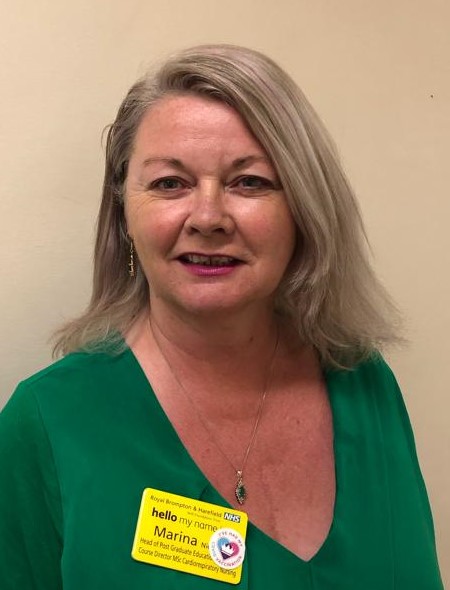I always knew I was going to become a nurse. I think it started when I received a nurse’s uniform and plastic stethoscope when I was a child. I wanted to help people.
This ambition was confirmed when I did two weeks’ work experience in a hospital at 15. I tried to get into nursing school in my local hospital in Derry when I left school, but there was a waiting list, and I decided I didn’t want to wait.
So, I applied to a few hospitals in England and secured a place working in Hillingdon, Harefield and Mount Vernon Hospitals in 1988.
Career journey
I qualified in 1991, and my first staff nurse job was on a male medical ward at Hillingdon Hospital. They mainly specialised in patients with cardiac and respiratory problems, and it was then that I decided that I wanted to specialise in this area. 
I came to Harefield Hospital in 1994 and worked in what was then the Medical Care Unit (now Oak and Acorn). I wanted to do a specialist cardiac and respiratory course and was fortunate to get a place on an ENB 249 Cardiac and Thoracic course.
I developed a keen interest in supporting junior staff nurses as I remembered how scary it was once you first become qualified. Once you change from a student nurse uniform to a qualified nurse uniform, you feel that you’re expected to know everything, which isn’t the case.
In 1996 I became a senior staff nurse and had two days as a practice development sister where I would work with junior nurses and student nurses. This role expanded, and by 2001, I had become a senior practice educator for Cardiology at Harefield.
In 2004, the then chief executive encouraged me to do my MSc at the London School of Hygiene and Tropical Medicine. It was hard to combine work and study, but it was worth it. My dissertation topic was women and heart disease, which still interests me today.
I then changed roles and became project lead for the Productive Ward: Releasing Time to Care programme, which sought to help NHS staff improve productivity and reduce waste and to provide better quality, safer care, and a better experience for patients and staff. The project was based on how nurses could spend more time at the patient’s bedside, which incorporated a lot of change management.
I then became a Teaching Fellow with Imperial College, helping with the MSc Cardio-Respiratory Nursing. I became Interim Head of Postgraduate Education (Nursing), and in 2015, this role was made permanent. I enjoy seeing nurses develop clinically and academically. For example, we run the MSc Cardiorespiratory Nursing in partnership with Buckinghamshire New University.
We are lucky to have experts in this field teaching this course. You can see the nurses’ confidence levels rise during this two-year programme. At the start of the course, you can see some nurses thinking, “What have I let myself in for?” But then when they have finished, they can’t believe it. Some have even said they enjoyed it!
I’ve had previous MSc nurses come back to teach on the programme. The MSc also helps nurses get promotions into roles such as Clinical Nurse Specialist. I like to help nurses develop their careers and raise awareness of what is available to them.
Developing people is what motivates me. I enjoy encouraging staff to think about what they want and how I can help them get there. Seeing the expressions on nurses’ faces at the graduation ceremonies keeps me motivated too.
How can we help our patients? By ensuring ensure we provide evidence-based care to our patients. This drive motivates me and is why I’m currently doing a PhD.
